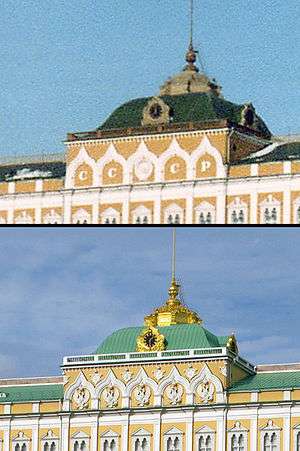Decommunization
.jpg)
Decommunization is a process of dismantling the legacies of the communist state establishments, culture, and psychology in the post-communist states. It is sometimes referred to as political cleansing.[1] The term is most commonly applied to the former countries of the Eastern Bloc and the post-Soviet states to describe a number of legal and social changes during their periods of postcommunism.
In some states decommunization included bans on Communist symbols. While sharing common traits the processes of decommunization have run differently in different states.[2][3]
Decommunization organizations

Investigators and prosecutors
- Cambodia - The Extraordinary Chambers in the Courts of Cambodia
- Czech Republic - The Office of the Documentation and the Investigation of the Crimes of Communism
- Slovakia - The Institute of National Memory - Ústav pamäti národa (Sk)
- Estonia - The Estonian International Commission for Investigation of Crimes Against Humanity
- Germany - The Federal Commissioner for the Stasi Records (BStU)
- Hungary - The Institute for the History of the 1956 Hungarian Revolution
- Lithuania - The Lithuanian Center for the Research of Genocide and Resistance
- Poland - The Institute of National Remembrance — Commission for the Prosecution of Crimes against the Polish Nation
- Romania - The Institute for the Investigation of Communist Crimes in Romania
- Ukraine - The Ukrainian Institute of National Remembrance
Prosecution of former communists
Lustration came to refer to government policies of limiting the participation of former communists, and especially informants of the communist secret police, in the successor political appointee positions or even in civil service positions.
Prosecution of Communist state leaders
- Bulgaria - Todor Zhivkov was sentenced to 7 years in prison, but served only one day because he was freed for "health reasons".
- Cambodia - Kang Kek Iew is so far the only indicted Khmer Rouge leader, while Pol Pot and others lived free without charges.
- East Germany - Eric Honecker was arrested, but soon released due to ill health. Several people, such as Egon Krenz, were convicted.
- Poland - Wojciech Jaruzelski has avoided most court appearances citing poor health. He died in 2014
- Romania - Nicolae Ceaușescu was sentenced to death and executed.
Results
Communist parties outside the Baltic states were not outlawed and their members were not prosecuted. Just a few places attempted to exclude even members of communist secret services from decision-making. In a number of countries, the communist party simply changed its name and continued to function.[4]
Stephen Holmes of the University of Chicago argued in 1996 that after a period of active decommunization, it was met with a near-universal failure. After the introduction of lustration, demand for scapegoats has become relatively low, and former communists have been elected for high governmental and other administrative positions. Holmes notes that the only real exception was former East Germany, where thousands of former Stasi informers have been fired from public positions.[5]
Holmes suggests the following reasons for the turnoff of decommunization:[5]
- After 45–70 years of state communism, nearly every family has members associated with the state. After the initial desire "to root out the reds" came a realization that massive punishment is wrong and finding only some guilty is hardly justice.
- The urgency of the current economic problems of postcommunism makes the crimes of the communist past "old news" for many citizens.
- Decommunization is believed to be a power game of elites.
- The difficulty of dislodging the social elite makes it require a totalitarian state to disenfranchise the "enemies of the people" quickly and efficiently and a desire for normalcy overcomes the desire for punitive justice.
- Very few people have a perfectly clean slate and so are available to fill the positions that require significant expertise. People begin remembering that Lenin's idea that "every cookwoman may govern the state"[6] failed.
- Matthew White found an LA Times and a The Times (London) article from 1998 and 2000 respectively that stated that 3 to 6 million Russians and other members of former Communist states died or were not born due to decreased living conditions after the fall of communism.[7][8]
See also
- Anti-communism
- Communist crimes in Polish legal system
- Decommunization in Russia
- Decommunization in Ukraine
- Denazification
- De-Stalinization
- Golaniad
- Lustration in Poland
- Proclamation of Timișoara
- Vergangenheitsbewältigung
- Estonian International Commission for Investigation of Crimes Against Humanity
References
- ↑ Jennifer A. Yoder (1999) "From East Germans to Germans?: The New Postcommunist Elites", ISBN 0-8223-2372-9,, pp.95-97
- ↑ Lithuanian ban on Soviet symbols, BBC News, 17 Jun 2008, retrieved 3 Jun 2016
- ↑ Shevchenko, Vitaly (14 April 2015). "Goodbye, Lenin: Ukraine moves to ban communist symbols". BBC News. Retrieved 3 Jun 2016.
- ↑ After socialism: where hope for individual liberty lies. Svetozar Pejovich.
- 1 2 Michael Mandelbaum (Ed., 1996) "Post-Communism: Four Perspectives", Council on Foreign RelationsISBN 0876091869
- ↑ Note: The quotes "Каждая кухарка может управлять государством" ("every cookwoman may govern the state")) or "Каждая кухарка должна научиться управлять государством" ("every cookwoman must learn to govern the state") are commonly misattrubuted to Lenin; see ru:Ленинские фразы
- ↑ Hough, Jerry (18 August 1998). "See http://necrometrics.com/all20c.htm". LA Times. External link in
|title=(help) - ↑ See http://necrometrics.com/all20c.htm (27 Jan 2000). La Times (London) http://necrometrics.com/all20c.htm. Missing or empty
|title=(help)
